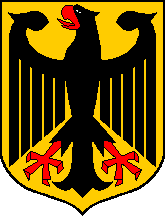Difference between revisions of "Directory:Germany"
(→History: (shameless link-building)) |
|||
| (10 intermediate revisions by 3 users not shown) | |||
| Line 1: | Line 1: | ||
| − | '''[[Country_Name:=Germany|Germany]]''' ([[Country_Code:=DE|DE]]), officially the | + | '''[[Country_Name:=Germany|Germany]]''' ([[Country_Code:=DE|DE]]), officially the Federal Republic of Germany, is a country in Western-Central Europe. It is bordered on the north by the North Sea, Denmark, and the Baltic Sea, on the east by Poland and the Czech Republic, on the south by Austria and [[Directory:Switzerland|Switzerland]], and on the west by [[Directory:France|France]], [[Directory:Luxembourg|Luxembourg]], [[Directory:Belgium|Belgium]] and the Netherlands. |
| − | == | + | ==Culture== |
| + | Germany is often called Das Land der Dichter und Denker (the land of poets and thinkers). German culture began long before the rise of Germany as a nation-state and spanned the entire German-speaking world. From its roots, culture in Germany has been shaped by major intellectual and popular currents in Europe, both religious and secular. As a result, it is difficult to identify a specific German tradition separated from the larger context of European high culture. German literature can be traced back to the Middle Ages and the works of writers such as Walther von der Vogelweide and Wolfram von Eschenbach. Various German authors and poets have won great renown, including Johann Wolfgang von Goethe and Friedrich Schiller. The collections of folk tales published by the Brothers Grimm popularized German folklore on the international level. | ||
| + | |||
| + | ==States and Cities== | ||
Germany is a democratic parliamentary federal republic of 16 states (Bundesländer). The country previously consisted of several sovereign states with their own history, culture, and religious affiliation. | Germany is a democratic parliamentary federal republic of 16 states (Bundesländer). The country previously consisted of several sovereign states with their own history, culture, and religious affiliation. | ||
| + | |||
| + | ==History== | ||
| + | One interesting study documents how the strategic bombing of Germany was [[Directory:American Journals and the Strategic Bombing of Germany|documented in popular American journals]]. | ||
| + | |||
| + | ==External links== | ||
| + | [[Image:Flag.jpg]] | ||
| + | [[Image:Bundeswappen.jpg]] | ||
| + | [[Image:Germany.jpg]] | ||
| − | |||
[[Total Area (km²):=357,050|357,050]] | [[Total Area (km²):=357,050|357,050]] | ||
| − | [[Density:=231|231]] | + | [[Density (km²):=231|231]] |
[[Category:Country]] | [[Category:Country]] | ||
Latest revision as of 17:18, 10 September 2010
Germany (DE), officially the Federal Republic of Germany, is a country in Western-Central Europe. It is bordered on the north by the North Sea, Denmark, and the Baltic Sea, on the east by Poland and the Czech Republic, on the south by Austria and Switzerland, and on the west by France, Luxembourg, Belgium and the Netherlands.
Culture
Germany is often called Das Land der Dichter und Denker (the land of poets and thinkers). German culture began long before the rise of Germany as a nation-state and spanned the entire German-speaking world. From its roots, culture in Germany has been shaped by major intellectual and popular currents in Europe, both religious and secular. As a result, it is difficult to identify a specific German tradition separated from the larger context of European high culture. German literature can be traced back to the Middle Ages and the works of writers such as Walther von der Vogelweide and Wolfram von Eschenbach. Various German authors and poets have won great renown, including Johann Wolfgang von Goethe and Friedrich Schiller. The collections of folk tales published by the Brothers Grimm popularized German folklore on the international level.
States and Cities
Germany is a democratic parliamentary federal republic of 16 states (Bundesländer). The country previously consisted of several sovereign states with their own history, culture, and religious affiliation.
History
One interesting study documents how the strategic bombing of Germany was documented in popular American journals.
External links
357,050
231


